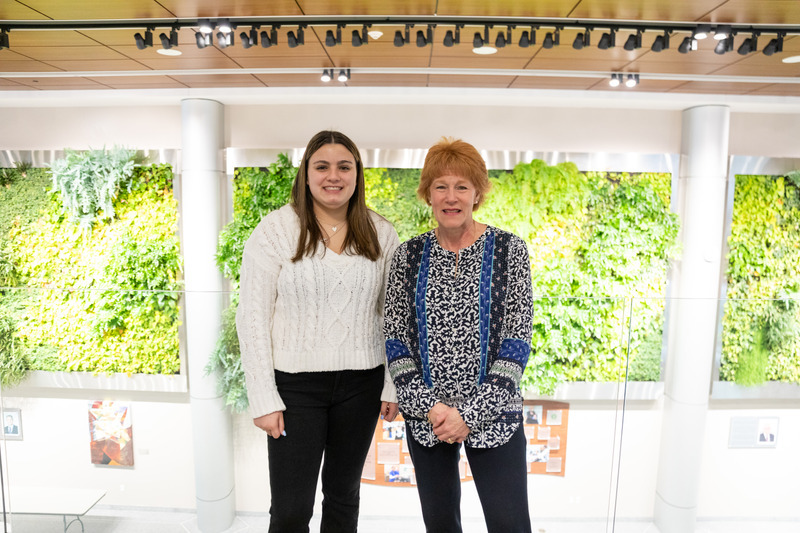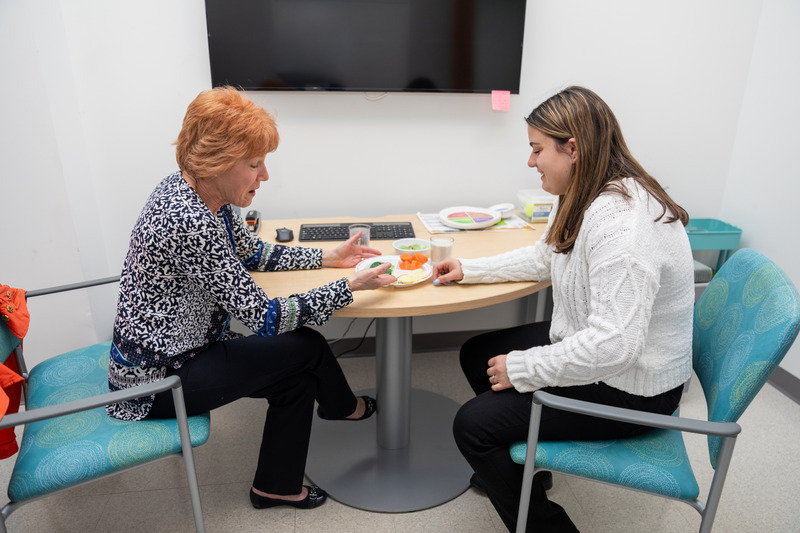


Living with diabetes
Photos by Ashley Barnas Larrimore March 25, 2024
UD Nutrition Clinic takes personalized approach to diabetes care, education
At 10 years old, Madison Lucas noticed she went to the bathroom often and had lost significant weight.
“The boy next to me in class had a stomach bug, so I just figured I’d caught what he had,” Lucas said.
Then, her mom noticed her daughter falling asleep at the dinner table, and they went to the hospital. There, doctors found her blood sugar reading was over 800, and her A1C had reached a dangerous level of 11.9. She was diagnosed with type 1 diabetes (T1D).
“I had no idea what diabetes even was, but my life changed forever that day,” Lucas recalled.
She was forced to grow up a lot faster than most kids her age.
“There were steps I had to take daily to keep myself alive,” she said. “I wanted to be independent, so I stopped going to the nurse’s office to take insulin and administered it on my own. But I also didn’t want to hide my diagnosis because it was such a major part of my life that people should know about.”
She credits much of her success to her diabetes education counselor, Julie, who inspired her career path.
“She saved my life, and I want to help kids in the ways she helped me,” Lucas said.
Lucas, a first-year nutrition and dietetics major, recently began a clinical rotation in the University of Delaware Nutrition Clinic that's supported, in part, by the Eugene A. Petracca and Alicia Ann Petracca Experiential Learning Funding in Nutrition and Dietetics. There, she’s working alongside Melissa Stabler, a registered dietitian nutritionist (RDN) and certified diabetes care and education specialist (CDES). RDNs are nutrition experts with a minimum of a graduate degree from an accredited dietetics program; they also complete a supervised practice requirement and national registration examination and participate in continuing education activities throughout their careers.
“Melissa and I connected right away, and I knew this would be a great experience,” Lucas said. “I’m learning how she helps patients cope.”
Stabler, who spent 35 years at the Wilmington Department of Veterans Affairs Medical Center, graduated from UD’s College of Health Sciences (CHS) in 1985 with an RDN credential after completing her bachelor’s degree and internship in nutrition. She also got her master of business administration from UD’s Alfred Lerner College of Business and Economics in 1992.
Stabler also brings first-hand experience to her role. She was diagnosed with T1D at 12 years old and suffered from the classic symptoms Lucas described.
“It gives you perspective,” she said. “I was diagnosed as a child, so I had to listen to what my mom and dad said. But working with adults who have type 2 diabetes (TD2) and have been eating what they want for years, it’s a process to change behaviors.”
Helping them live with it
More than 38 million people in the U.S. have diabetes, while nearly 98 million have prediabetes, according to Centers for Disease Control and Prevention data. The American Diabetes Association (ADA) said 70% of people with prediabetes eventually develop diabetes. However, with proper action, people with prediabetes can improve their outcomes and reverse the condition.
UD’s Nutrition Clinic is open to the public, with seven RDNs who provide nutrition counseling to approximately 1,200 clients per year, underscoring the clinic's critical role in improving community health. The clinic also provides hands-on, practical learning experiences for nutrition students and dietetic interns.

People with T1D don’t produce insulin and must learn to manage their chronic condition at an early age by managing food, activity and medications.
“They learn to recognize the signs of low blood sugar, including confusion, irritation, weakness in the knees or slurred speech,” Stabler said. “They learn to carry glucose tablets and keep juice boxes and snacks in the car. Those life skills come in clutch.”
T2D, a condition in which the body doesn’t use insulin properly and/or does not produce enough insulin, is more common, with the ADA reporting 1.2 million new cases in the U.S. each year. For clients who are either pre-diabetic or have diabetes, the onset can be sudden and shocking.
“They just want their diabetes to go away, or they blame themselves,” Stabler said. “The stigma surrounding diabetes is real. But with diabetes, it’s all about management. If you ignore it, you’ll have problems.”
UD’s Nutrition and Health Coaching clinics also run the Prevent T2 program, a part of the CDC-National Diabetes Prevention Program that promotes lifestyle changes and has transformed many patients. One in three Americans have prediabetes, and of those, the majority don’t know they have it. By screening for prediabetes, those with prediabetes can reduce their risk of developing T2D diabetes by 58% through completion of the Prevent T2 program.
“Some individuals with T2D can go into remission if they lose weight and stabilize their blood sugars,” Stabler said. “Healthy habits can keep it at bay. But your blood sugars will rise if you eat excess simple carbs like ice cream daily and don’t control your weight.”
But that doesn’t mean people with diabetes can’t have ice cream. When developing care plans, “no” isn’t a word Stabler uses.
“We never tell someone they can’t have pizza; we tell them to add a salad to the other half of their plate,” she said.
That was the same advice Stabler remembers getting early in her diabetes diagnosis.
“My doctor told me, ‘Don’t let anybody ever tell you that you can’t have ice cream again. Eat it and run around the block a few times,’ Stabler recalled. “Giving our patients tools to help them manage is helpful, and once we let them know it’s not forbidden, it’s often not as desirable.”
March marks National Nutrition Month®. This year’s theme from the Academy of Nutrition and Dietetics is “Beyond the Table,” and perfectly encompasses how Stabler cares for her patients. Her plans go beyond healthy eating strategies as she looks at the whole person and aims to meet them where they are.
“We work to change their perspective and help them accept their diagnosis,” Stabler said. “We’re so fortunate to live in a world with many tools that help people control their diabetes. When I was diagnosed with T1D, we didn’t have glucometers; there were no good controls.”
For Lucas, her motivation is similar — equip people with tools to motivate them to be successful.
“I want to connect with children and tell them I’ve been in their spot before,” Lucas said. “I want to help them get through it and let them know I have no doubt they will succeed.”
UD’s Nutrition Clinic is open to the public, takes most major insurance plans, and enrolls participants in the Prevent T2 program on an ongoing basis. To learn more or make an appointment, please call 302-831-1165 or email nutrition-clinic@udel.edu.
Contact Us
Have a UDaily story idea?
Contact us at ocm@udel.edu
Members of the press
Contact us at 302-831-NEWS or visit the Media Relations website

